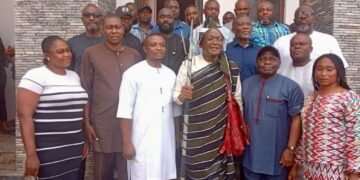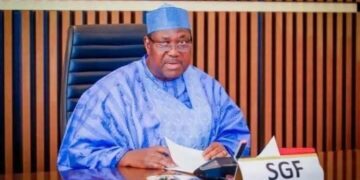“Ajuwaya!” or “about-turn!” are common expressions in military parlance that have long become instruments for comic relief in our clime. Those conversant with the now rested hilarious TV series, Samanja, can easily relate. The ‘as you were’ in ajuwaya and the ‘U-Turn’ in about-turn both connote a return to ‘the before’, the past, as it were. The Nigerian national anthem has just done an ajuwaya from 2024 to 1960!
A nation’s national anthem is a national symbol of identity. Others are the national pledge, the flag and the coat of arms. They are supposed to inspire the passion for patriotism in the citizenry.
Nigeria’s first national anthem, “Nigeria, We Hail Thee”, was adopted on October 1, 1960, the country’s Independence Day. It was written in 1959 by a British expatriate, Lillian Jean Williams and composed by Frances Berda in the same year.
18 years later in 1978, this anthem was supplanted with a new one, the “Arise, O Compatriots”, by the then military administration of General Olusegun Obasanjo. This was composed by the Nigerian Police Band directed by Benedict P. Odiase. The lyrics were picked from the national contest entries of P.O. Aderibigbe, John A. Ilechukwu, Sota Omoigui, Eme Akpan and B.A. Ogunnaike.
The 1978 change was said to have been a direct response to petitions and outcries by Nigerians against the first anthem. They felt that having been written and composed by expatriates, it was more of a strong vestige of their colonial experience. And given the nationalistic fervour that swept across Africa in the 70s, it was only natural that the country had to reassert its independence status by having a fully home-brewed anthem.
Obviously, our federal legislators must have undergone a sudden epiphany, ludicrous as it appears, and seen more clearly that those reasons are no longer strong enough. They must have realised that the one we rejected in 1978 is the best thing for us after all.
Following a Presidential assent on Wednesday May 29, to a Bill passed by the National Assembly, Nigeria has marched backwards and retrieved its independence national anthem dumped 46 years ago. Both Chambers of the Assembly passed the bill for the reversion from “Arise, O Compatriots” with a speed of light, and our hard working President did not disappoint. He responded with equal speed in granting his assent.
I must confess that I have always loved the old national anthem, perhaps because it is the anthem that I grew to meet. To my ears, it is beautifully soft, melodious and emotional. However, I am not swayed by the razzmatazz that birthed its re-adoption. Nobody has told us exactly what is wrong with the anthem we have just condemned to the cooler.
It is baffling that in the midst of all the challenges Nigerians are facing today, reverting to the old national anthem became a priority to our National Assembly members. My prayer is for God not to allow the disconnect between our legislators and their constituents grow into an irredeemable gulf.
Read also: Benue State Attorney General Visits Agate Radio
In any case, we can’t blame the lawmakers. Having failed to “Arise” as “Compatriots”, Nigerians have to return to hailing “Our Own Dear Native Land”, in the hope that “In Brotherhood We Stand”. We have failed to obey Nigeria’s call “To Serve Our Fatherland with love and strength and faith”, and “with heart and might”, so we have to go back to God and beg Him to “help us to build a nation, where no man is oppressed”, so that, “with peace and plenty, Nigeria will be blessed”. Since God appeared not to have guided “our leaders right” up till now, and our nation appears not to be “bound in freedom, peace and unity” as prayed for in the 1978 national anthem, we must retrace our steps and revert to the warm womb of our “Sovereign Motherland” for succour.
While we must clap for our National Assembly members for working so hard to protect and project the interests of their constituents, they should not be too distracted by the sonorous beats of the ‘new old’ anthem to forget the other equally urgent and important (in fact, far more important) needs of their constituencies.
As we marvel at the speed with which this bill was passed and assented to, we eagerly look forward to the time when the National Assembly would speedily churn out laws to deal deadly blows to corruption, insecurity, nepotism, wickedness and the other evils that have pummelled citizens into forced enslavement. We particularly look forward to the Assembly speedily passing into law a bill that will drastically reduce members’ emoluments and pecks of office to free more money which can be deployed into people-oriented projects.
The simple truth is that, in Nigeria today, the average citizen cares very little about the sound, letters or spirit of the national anthem. They are concerned more with how to get the next meal; how to go about their legitimate duties without molestation or harassment; how to be secure in their homes and on the streets; how to get jobs, etc. They want the government to address the nation’s multidimensional poverty so that they can, at least, access life’s basics.
Having experienced this seeming comic epiphany and done ajuwaya on our national anthem, let us do so on other national values that promote justice, equity, fairness, unity and sincerity of purpose. Let our actions and utterances be guided more by patriotism and allegiance to nationhood rather than our stomach, tribe, tongue or religion.
Nigeria, We Hail Thee!
Written by Igba Ogbole
WhatsApp: 08138698484






